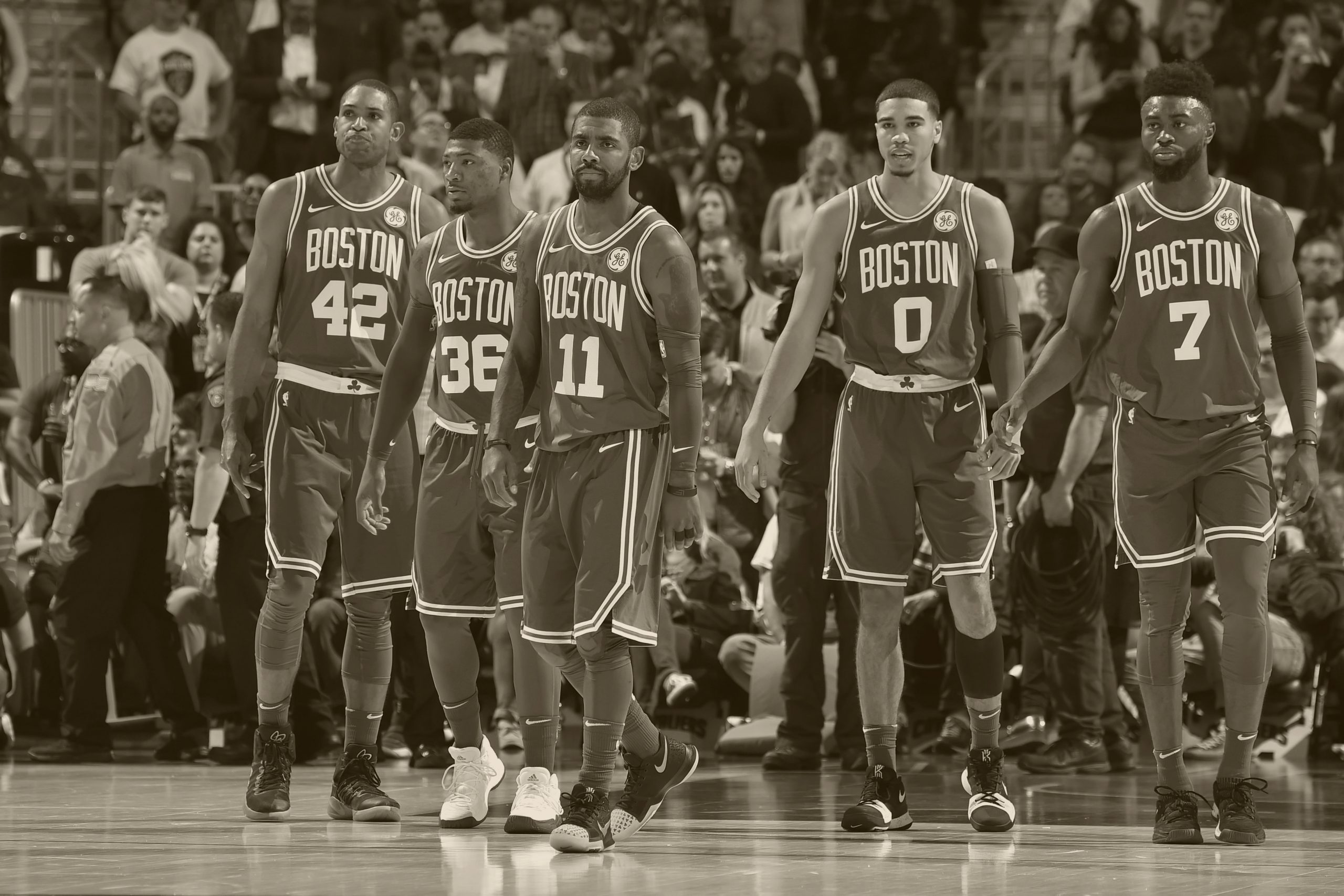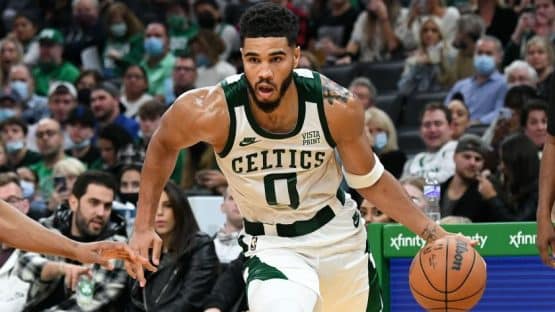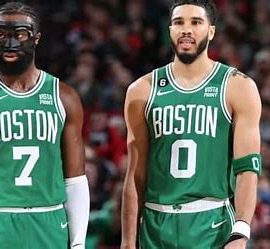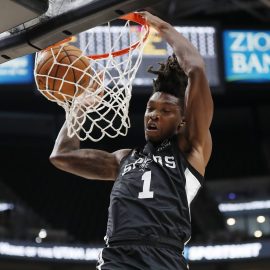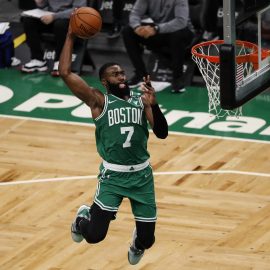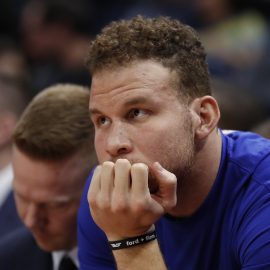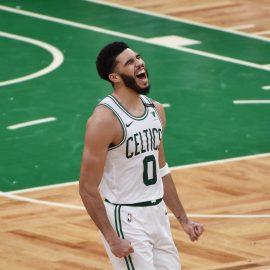Every morning, we compile the links of the day and dump them here… highlighting the big story line. Because there’s nothing quite as satisfying as a good morning dump.
“A couple years ago when we were talking about — Danny puts this whole kind of plan together. We want to be as good and give ourselves as many chances as possible, and when things that are tough happen, we don’t want to take big dips. We still want to be incredibly competitive,” Stevens said. “This group, we had two really tough injuries — three really tough injuries with [Daniel] Theis. There’s no dip. They just battled. They were special.”
Since we’ve moved on to the retrospectives and somewhat rose-tinted glances back at the past few years, Tom Westerholm’s piece for MassLive is a good starting point.
The Celtics didn’t tank.
It’s difficult, from this perspective, to recall how contentious that decision was at the time. Fans were seriously ticked off that the Celtics were going to miss a chance to pick up Wiggins or Jabari Parker. How quickly we forget the hand-wringing that went with the Celtics’ decision to pick up Marcus Smart at a time when the Nets were, well, if not fantastic, at least good enough that the first Nets pick tendered in the trade was the worst pick of the entire rebuild: James Young.
As Branch Ricky once said, ‘luck is the residue of design’, and the Celtics did indeed catch a few lucky breaks.
But let’s take a step back and reconsider some of those lucky breaks: I don’t like Jason Kidd–I don’t know a Celtics fan out there that does–but collectively, we owe him one. His thoroughly crapulent job coaching a very talented Nets team led to the rapid disintegration of that team and a plunge into the high lottery.
However, how much of that was luck–and how much of that fit into an overall pattern of Nets mismanagement?
A team that was willing to convey 4 picks (counting the swap) for Pierce and Garnett was not a team likely to make a good coaching hire–and the Nets had already hired Kidd before agreeing to the trade.
Of course, people have spent the last few years coming up with reasons to discount the Nets trade–as though Ainge’s ability to fleece the Nets was something that nobody else could’ve done.
But is that really the case? What would Prokhorov have given up to land Kobe Bryant? Dirk Nowitzki?
We also forget that Boston was willing to take back a huge pile of bad money (and they actually got some good returns from Humphries and Wallace–not equal to what they were being paid, but they gave the team some good minutes).
You look at Philly–Philly had already decided they were going to augur in their next umpteen seasons.
But their ownership wanted to tank as cheaply as possible.
Do you think Philly couldn’t have picked up one of those juicy Nets picks for taking Gerald Wallace and/or Kris Humphries off their hands?
It’s like Boston’s three point defense under Brad Stevens: Every year it’s been better than average and every year we hear that result is ‘luck.’
There is, of course, a measure of luck in all of this: But not as much as there seems to be.
And what it boils down to is what Stevens said in that quote above–Ainge wanted to give the Celtics ‘as many chances as possible.’
You tank, and–moreover–you tank so blatantly that you have to scramble to meet the contract mandated salary floor every year–and you are giving yourself only the draft–you have no other means to improve.
Yes, the Sixers seem to have done reasonably well, landing Simmons and a finally healthy Embiid (I’m not sold on his long-term health). But the team’s role players are uniformly terrible. I mean, if you’re picking up Belinelli two-thirds of the way through the season because you need his spot-up shooting, you are not a title contender. Period. End. Of. Story. So the Sixers, whose tanking pattern was set by Presti, the Thunder, and their equally parsimonious ownership, look–at least to my eyes–poised to repeat the Thunder’s legacy of what-ifs. I don’t foresee them keeping their core, because it’s going to cost them a fortune.
Contrast the Sixers’ cheapness with the Celtics–who were willing to spend every year. By signing players like Amir Johnson, Jonas Jerebko and Tyler Zeller to huge one-year-plus-team-option contracts, the Celtics were able to retain the services of competent role players, while keeping long-term flexibility. That’s ownership being willing to spend a bit of money–and it’s not even ownership’s private stash. By contract the money these players get comes out of team revenue, not the private fortunes of the owners. C’s ownership wasn’t interested in skimming as much revenue off the team as possible (and that’s in sharp contrast to the Sixers).
What was accomplished by signing these guys to generous contracts? It’s simple: The Celtics ended up with a deep team that, most importantly, didn’t suck. And with these contracts having non-guaranteed second years, it meant that this deep, decent Celtics team regularly had cap space too. Space they used on Horford and Hayward.
Then there’s the decision to hire Stevens.
I want to take a close look at that, because there’s an aspect of that hire that I think is regularly overlooked.
Ainge went after Stevens.
You think about how so many coaches get jobs these days, and a lot of it is through naked self-promotion. Mark Jackson is perhaps the most egregious example, but Jason Kidd, Derek Fisher, George Karl, all these bad coaches develop a knack for behind-the-scenes lobbying for jobs–for, in short, shameless self-promotion.
Then you’ve got coaches like Stan van Gundy, Doc Rivers and Tom Thibodeau, who all insisted on having the last word on personnel too: These guys got these jobs by convincing, first themselves, then their new teams, just how awesome they were.
Contrast that with Stevens.
In time, Stevens might have ended up having to develop the same self-promotional delusions that afflict the NBA’s circulating pool of employed coaches and unemployed coaches in broadcasting booths, but Ainge went out and grabbed him before he had to learn all of the bad habits required to obtain a coaching job in the NBA.
As a result, the Celtics landed a guy who was uniquely positioned to appreciate the limits of his abilities as a coach–because he hadn’t spent the last decade trying to convince people that those limits didn’t exist in order to get a better job, to get a pay raise, etc.
Then there are the trades.
You could write a book on the way Ainge navigated this rebuild–in fact, I wouldn’t be surprised if someone’s working on one right now.
How in the world did Danny “win” all these trades (except the David Lee/Gerald Wallace boondoggle)?
It’s simple: Ainge knows when to say ‘no’.
I mean, Justise Winslow near-debacle not withstanding (although I don’t think that would’ve worked out as badly as some think–because I think Winslow is tailor made for Stevens/Ainge teams).
Ainge puts a value on his “assets” and he won’t “sell” them for less than what he thinks they’re worth.
So he’s got a price he’s prepared to pay for, say, Jimmy Butler, but there’s no way on earth you can pressure him into exceeding it. It doesn’t matter if the twitterverse is exploding with hot takes about how Ainge is a moron, and if he’s criticized by the Boston media’s collection of mouths connected to brains that are dimly aware that basketball is played indoors with an orange ball and that LeBron James exists, it doesn’t affect him a bit.
The Isaiah Thomas deal has been analyzed to death–but think about it–that deal was the ‘grandchild’ of the Pierce/Garnett deal and the child of the Zeller/Thornton/pick deal with Cleveland. The Celtics leverage their trades. They don’t make them in a vacuum.
Then there are the draft picks.
The NBA draft is, routinely, one of the most thoroughly botched spectacles in sports. Teams like Sacramento spend whole decades in the lottery without drafting enough talent to get out of it. Rarely–rarely–do you see a team with competent management drafting high in the lottery.
And what were the results?
When gifted with top three picks, in back-to-back years, Ainge made highly controversial selections. People hated the Jaylen Brown pick. They pointed at a horrible freshman year at Cal-Berkeley, where our young scholar was taking graduate level courses in the humanities, while playing for a coach who had about as much of a clue what to do with Brown as I would have with a ten ton sheet metal punch press.
Then there was the decision to pass on Fultz.
You can count me as one of the guys who thought that Ainge got far too little in return for giving up Fultz–and then the guy they picked instead of him came one missed shot away from setting the rookie playoff scoring record.
And Fultz? Fultz was a victim of yet another difference between the Celtics and the rest of the NBA.
The Celtics run a very tight ship. The Sixers? Not so much. The Sixers burned their organization to the ground, and the end result was near-criminal mismanagement of Nerlens Noel, Jahlil Okafor and Markelle Fultz. There was no support system for these guys and, in fact, their coach routinely dumped on each one of them. There was no organizational ‘pride’ as it were, no interest in helping these guys become professionals. The Sixers drafted Fultz and then tossed him off the dock without a life jacket and said, essentially, ‘figure it out, we’ll be back in a few months.’
I’m not saying Nerlens Noel, to pick a potential future Celtic, would be a max-contract guy now if he was drafted by the Celtics–but if the C’s pick him up with the MLE this offseason, who among us would be surprised if he plays better than he did in Philly and Dallas?
Page 2: Where the nose knows
It wouldn’t be the end of the season without some undisclosed injuries, and a pair of surprises emerged Monday. Aron Baynes said he broke his nose in Game 6 in Cleveland and will need surgery. Ainge said Kyrie Irving was not on hand for Game 7 due to surgery to repair a deviated septum.
“I don’t think he wanted to be seen. He’s a really good looking guy, has his movie career,” cracked the Celtics president said of Irving.
Baynes grabbed his nose with a thumb and forefinger and gave it a tug to illustrate the issue.
Ah, yes, the Celtics’ fellow Australians, now linked by their noses.
Baynes’ broken nose is a rather amusing bit of payback considering that Kyrie’s surgery was apparently needed to correct an issue caused by Baynes earlier in the season
Finally: Where’s Evan Turner when you need him?
The Rockets at one point had missed 27 straight 3-pt FG tonight.@EliasSports tells us that's the most consecutive missed 3s in a playoff game in NBA history.
— ESPN Stats & Info (@ESPNStatsInfo) May 29, 2018
Fortunately for Celtics fans, the Rox, the very night after an embarrassing string of clunkers by ye Green Ande White, did even worse from three-point-land.
Please note the following:
I am over 40. That means that the world has already passed me by, and any complaining I do is about stuff that younger people have grown up with and find normal.
However:
It is impossible to watch these back-to-back embarrassments and not wonder what would have happened if any of these guys had a decent midrange game? The existence of offenses predicated solely on statistically valuable three point shots and high percentage shots at or near the rim (dunks/layups), has a huge hole in it when those shots aren’t falling.
Is it asking too much–is it really asking too much–for teams to have a fall-back on offense, a something like Evan Turner who could create two point shots and make a decent percentage of them?
It’s like it never occurred to Jaylen, Jayson or Rozier to try to rebuild their confidence by running sets that gave them looks closer to the basket. Nope. It was nothing but clanky home-run attempt after clanky home-run attempt.
The rest of the links
MassLive: Boston Celtics rookies: Ranking Jayson Tatum’s first season with Larry Bird, Bill Russell and other great Celtics rookies | Boston Celtics’ Terry Rozier on Kyrie Irving: ‘He’s our starter. He’s our starting point guard’ | Marcus Smart on Boston Celtics, free agency: ‘I’m here. They’re already planning for me to be here’ | Boston Celtics need Gordon Hayward, Kyrie Irving, per Danny Ainge: ‘We’re much better with Kyrie & Gordon’
Boston Herald: Don’t expect fireworks from Danny Ainge, Celtics this summer | Marcus Smart wants to be a Celtic, but there’s ‘a lot of factors’ involved | Celtics look to promising future day after agonizing defeat
ESPN: Smart on free agency: ‘I want to be in Boston’
Boston.com: What Danny Ainge had to say about the Celtics’ offseason plans
Providence Journal: Bill Reynolds: Raw talent gave fans a Celtics dream season
NBC Sports: C’s reflect on stellar season coming to a disappointing end
Add The Sports Daily to your Google News Feed!
